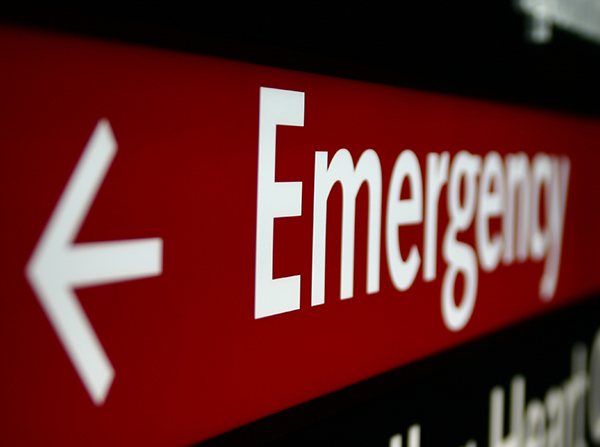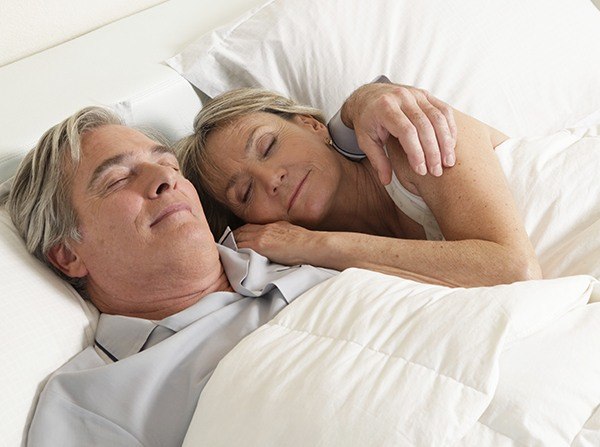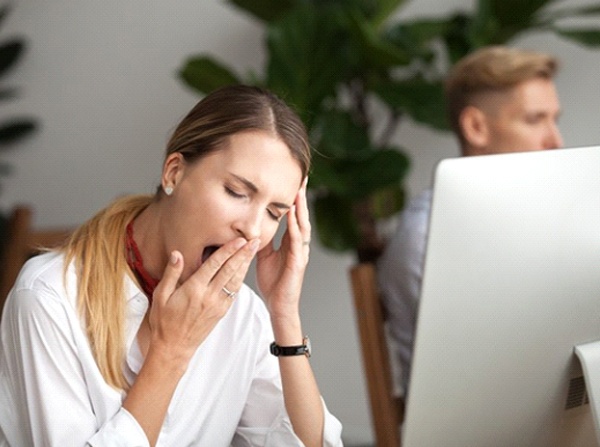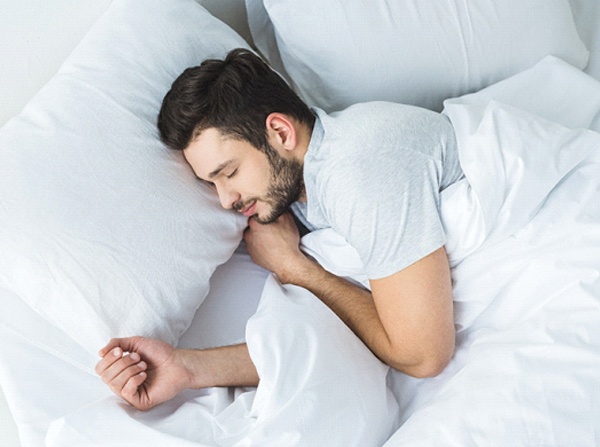
Sleep Apnea Treatment – Leesburg, VA
Wear an Oral Appliance and Get Your Zzz’s
Snoring every once in a while is harmless (if annoying for nearby sleepers), but if you’ve received complaints of loud or chronic snoring, it might be a sign that you’re suffering from sleep apnea. With this condition, your breathing decreases and even stops altogether while you’re asleep – potentially hundreds of times every night. Consequently, you might notice that you’re exhausted during the day and have trouble focusing – and over the long term, the health consequences could become even more severe. If you think you’re having trouble sleeping soundly at night, contact Downtown Family Dental of Leesburg for a consultation; if you do have sleep apnea, Dr. Pham can help you find an effective treatment.

Why Do I Have Sleep Apnea?

The most common form of this disorder is obstructive sleep apnea. This is when your tongue or other soft tissues relax when you fall asleep and collapse, blocking the airway. Patients who are overweight or are suffering from obesity are particularly likely to suffer from this condition. Other common risk factors include naturally narrow airways, smoking, diabetes, asthma, and consistent nasal congestion. Note that sleep apnea is more likely to develop in men and people with a family history of the disorder.
How Do I Know If I Have Sleep Apnea?

The most recognizable signs of sleep apnea occur while you’re asleep. Your partner or roommate may tell you if you’ve been snoring loudly or if they’ve noticed you gasping for air while you’re asleep. If you live on your own, it can be harder to notice sleep apnea, but you might notice the development of morning headaches, concentration problems, memory problems, dry or sore throat upon awakening, and general irritability.
What are the Long-Term Consequences of Sleep Apnea?

Living with sleep apnea means you’ll rarely (if ever) get enough sleep to function properly during the day. You could be at a higher risk for accidents on the highway or when operating heavy machinery. Furthermore, sleep apnea has been linked to increased blood pressure, heart disease, and diabetes; if you leave the condition untreated, you could eventually suffer from a life-threatening cardiovascular problem. For this reason, it is essential to have your sleep disorder diagnosed as soon as possible so that it can be addressed.
How Can Sleep Apnea Be Treated?

Once you’ve been diagnosed by a doctor or sleep specialist, you can start considering ways to eliminate your sleep apnea. Downtown Family Dental of Leesburg can offer oral sleep appliances that gently reposition your lower jaw in a way that keeps the airway clear. It’s most effective in cases of mild to moderate sleep apnea; it can also be used as a substitute for CPAP if you find that you can’t tolerate the machine. Each oral appliance is customized so that it fits comfortably in your mouth and addresses your unique issues. We might also suggest a few lifestyle changes in addition to professional treatment; for example, if you sleep on your back, switching to side sleeping might dramatically decrease your sleep apnea symptoms.
Causes of Snoring

Snoring is closely linked with obstructive sleep apnea because it is often a common warning sign of the sleep disorder. If you or your partner experience snoring, then you know how disruptive it can be, causing the rest of your household to lose their sleep as well. Thankfully, we offer sleep apnea treatment, and we have information on the possible causes of your snoring. Read on to learn more about how you can achieve a better night’s sleep without loud snoring.
Learn More About Causes of Snoring
Sleep Apnea FAQ’s

Do you or your sleeping partner wake up feeling like you didn’t get any sleep? Maybe you’ve noticed loud snoring or gasping for breath during the night? You probably have sleep apnea, a common sleep disorder that has an estimated 80% of cases left undiagnosed. If you’re experiencing symptoms, you’re probably curious about sleep apnea and what to do next. That’s why we’ve included the answers to some of the most frequently asked questions about sleep apnea! Keep reading to learn more.
Does the Position I Lay When Sleeping Affect My Breathing?
Sleep apnea is caused by relaxed throat muscles that collapse your airway, making it incredibly hard to breathe. If you’re laying on your back while sleeping, you’re actually putting yourself at a higher risk of collapsing your airway, leading to more disruptive sleep. Many patients end up training themselves to lay on their sides to help free up airflow. Watching the position that you sleep in combined with one of Dr. Pham’s oral appliances can help you enjoy a full night’s rest.
Why Should I Visit the Dentist for Sleep Apnea Treatment?
Many people are surprised to learn that they could receive high quality sleep apnea treatment from their dentist. However, Dr. Pham has a deep understanding of the mouth, the throat, the head, and all the other related areas that connect your oral health, making her the perfect resource. She can custom make an oral appliance that places your jaw in the right position, promoting easy breathing and restful sleeping!
Why Should I Choose an Oral Appliance Over My CPAP Machine?
The CPAP machine has been the standard for sleep apnea treatment in the past, however there are some significant reasons why patients are making the switch to an oral appliance. Primarily, this is due to ease of use. An oral appliance can fit in your pocket, making it easy to travel with, and it’s simple to put in and take out. However, CPAP machines are bulky, and the nasal masks often cause irritation, leading to patients avoiding the use of their treatment. Additionally, oral appliances don’t require set up or make any noise, giving you and your sleeping partner a better bedtime experience overall.
Why Am I Still Exhausted After Getting 10 Hours of Sleep?
So, you went to bed at 10 and you woke up at 8. Why are you still tired? This is why it’s estimated that there are millions of untreated cases of sleep apnea. Most people affected don’t know that they have this sleeping disorder, leading to restless nights without treatment. Sleep apnea causes you to stop and start breathing repeatedly during the night, affecting your rest. Typically, you must rely on your sleeping partner to recognize common symptoms like loud snoring, gasping for breath, and restlessness.
If you have any additional questions, or if you’re ready to get the sleep you deserve, don’t hesitate to contact Dr. Pham today to get started.